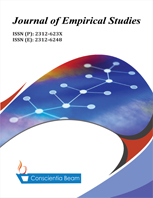Relationships Between Leadership Roles and Project Team Effectiveness as Perceived by Project Managers in Malaysia
Abstract
Today, more and more project teams are formed to achieve organizational objectives as organizations generally recognized the importance and benefits of project teams. However, in order to ensure project teams perform effectively, project managers need to learn and exhibit some of the leadership roles proposed by Quinn (1988) as these roles can impact the project team effectiveness. The current study developed a research model underpinned on Cohen and Bailey (1997) team effectiveness framework, Quinn (1988) leadership roles and Hoevemeyer (1993) five criteria of project team effectiveness. Based on a sample of 201 project managers, an empirical study had confirmed that a project manager’s leadership roles like mentor, facilitator, innovator and coordinator are important in influencing four out of five criteria of project team effectiveness which include team mission, goal achievement, empowerment, open and honest communication.

